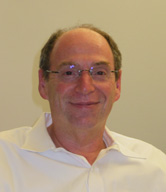 After the storms pass, Mark Fleisher, M.D., emerges from behind his office door and sees rainbows.
After the storms pass, Mark Fleisher, M.D., emerges from behind his office door and sees rainbows.
An associate professor in UNMC’s Department of Psychiatry, Dr. Fleisher helps patients with developmental disabilities and mental retardation regain a sense of normalcy in their lives.
“It’s challenging and very rewarding,” he said from his fifth-floor office on the Richard Young Center campus. “You decide what’s going on and how to help them best and if you do, it can be significant and if you can’t, you keep trying to solve the puzzle.”
For his compassion and selfless dedication in caring for special needs patients, Dr. Fleisher has received the Chancellor’s Gold ‘U’ Award for November.
“We don’t cure people,” he said. But, “if you can improve someone’s life 30 or 50 percent, that makes a huge difference.”
For his patients, that might mean helping them to work, ride a bus or earn money – tasks others often take for granted. “What we find mundane for them can become a special joy,” he said. “Some patients have more significant problems such as Autism, self-injurious behaviors or mood or thought disorders.”
|
|
Raised in Omaha, Dr. Fleisher is a 1987 graduate of the University of Nebraska College of Medicine, where he stayed to do his residency. The charismatic personality of Frank Menolascino, M.D., former chairman of the department of psychiatry and an internationally recognized expert in the area of mental retardation and psychiatric illnesses, influenced his career, as did the notion that psychiatry was more biologically and less psychologically oriented.
“We used to think that major mental illnesses were caused by the way a person was brought up or by a weakness of will,” he said, with a quiet demeanor and quick wit. “That was crazy. Almost all of the time it’s an underlying biological disorder.”
Of his patients, about 85 percent are adults with developmental disabilities ranging from minimal to profound mental retardation, genetic disorders or traumatic brain injuries. The majority hails from Nebraska and western Iowa.
“Clinical neuro-developmental psychiatry is a very narrow slice of psychiatry and a patient population very few are comfortable treating,” Dr. Fleisher said. “Here, every week is different and no two days in a row are alike. It would be boring if I spent 40 to 50 hours a week with patients who only were depressed or anxious.”
In helping each patient, Dr. Fleisher must take into account many factors including medical, behavioral and environmental influences. From there, he makes a diagnosis and plans appropriate treatment, which may or may not include medication.
In seeing the world through his patient’s eyes, he better understands himself. He said he doesn’t take basic pleasures for granted and is grateful for what he does have and what he can do. “There, but for the grace of God, go I,” he said. “It makes me think I’m pretty lucky after all and I try to instill that knowledge in others.”
Society, too, has gained a better understanding of people with mental retardation and developmental disabilities. “People often have biases until it strikes close to home,” Dr. Fleisher said. “Then the dawn breaks.”
At UNMC, Dr. Fleisher serves on UNMC’s Institutional Review Boards, the College of Medicine’s Scholastic Evaluation Committee and the UMA Compliance Committee. In the department of psychiatry he serves on the Residency Training Committee. “He .echoes a concern for patients, students and colleagues who might otherwise become marginalized in the systems of a large institution,” one nominator said.
Outside the office, he enjoys coaching youth soccer, reading and watching his son and daughter at athletic and musical activities. His wife, Cathy Schnieders, is a former pediatric intensive care unit (PICU) and post-anesthesia care unit (PACU) nurse who is completing a degree in elementary education.